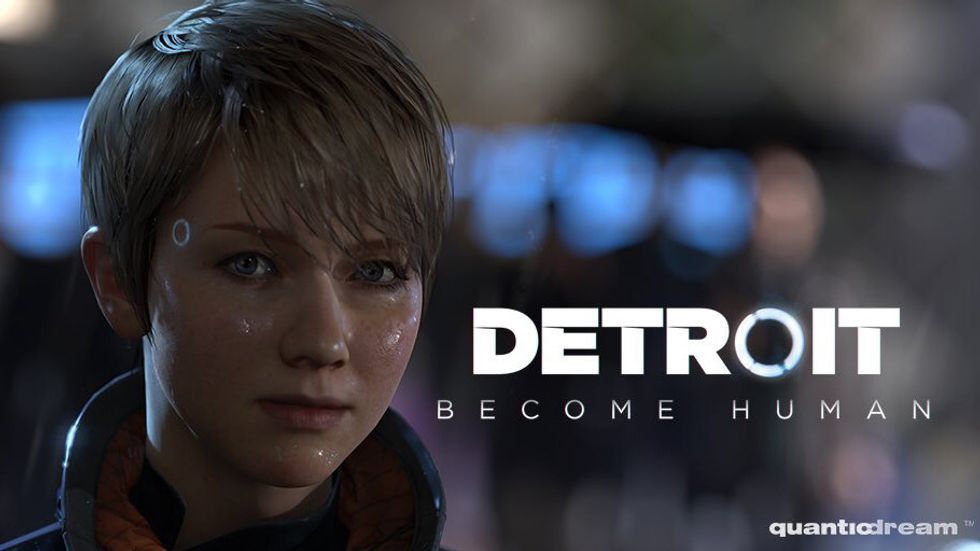Since the original tech demo, entitled "Kara", was released in 2012, the internet has been buzzing about Quantic Dream Studios take on the postmodern world of AI and robots. The studio is known for their exploration of difficult storylines, use of motion capture and their story and quick time event style games, and this latest edition is no exception to that model. However, what "Detroit: Become Human" has that other Quantic Dream games have not had is the connection back to social issues of the current time. In many ways, this game alludes to several different social issues all at once, from racial discrimination to the rights of artificial intelligence. Warning to those that may want to play the game in the future, spoilers are ahead.
The plot follows three androids, humanoid robots with differing functions, "bio-components", and personalities that make them seem almost human. The first, Connor, is an android detective with a mission to find why some androids become "deviant" or begin to think for themselves and disobey orders. He is paired with a famous detective who hates androids as the result of his son's death during surgery with an android surgeon.
The second is Markus, a caretaker android who has a close relationship with the older artist he cares for. He is encouraged to act on his humanistic "deviant" feelings and emotions by the artist and is even taught to express himself through painting. He is killed by police after the son of the artist is injured during an altercation, but manages to salvage himself out of the dump and goes on to lead the androids in a revolution.
The third is Kara, a nanny/housekeeping droid who is bought by an abusive father to take care of his daughter Alice, so that he can get high on "red ice" in peace. Kara becomes deviant after hearing the father abusing Alice after a bad high, and runs away with her, spending most of the game acting as her mother. She disguises herself and Alice and they spend the whole story trying to make the most of little moments and trying to cross the border to be free.
Each of the characters stories make the world come to life, and there is a lesson to be learned from each of them.
Firstly, with the climate of growth in the field of artificial intelligence, and with inventions like Sofia, the AI bot who bears a startling resemblance to the androids in the game, the talk of rights for robots is not too far away. The revolt of the android peoples is not just a harkening back to the Civil Right's movement, it's also a warning for the future. As discussed in media works like "Battlestar Galactica", "Terminator", "The Matrix" and others, since the invention of the computer there has been fear of artificial intelligence taking over. However, the warning of "Detroit" is softer in many ways; instead of the hostile takeover and destruction of humans, the androids simply ask for the same rights as humans. It can be equally as terrifying to consider something humans created as a being of equal worth, but in this scenario, the discussion of rights becomes real and the ethical question brought up in a new light.
The civil rights movement is alluded back to many times in the game, so much so it almost becomes overbearing and cheesy. There are two paths Markus can choose as the leader of the deviants, peaceful or violent. On the path of non-violence, the androids march in the streets chanting slogans for equal rights, sing a song called "Hold On" that is reminiscent of folk protest songs of the 1960's in the face of police brutality and stage a sit-in outside of a concentration camp for androids. It can be heavy-handed, but in the light of current events in the world, it seems like a timely way to bring up the events again. It's a lesson to look to the past for what we see in the future, bringing to mind the old adage that "those who forget history are doomed to repeat it".
Connor acts as a police officer in the game and is often presented with the choice to shoot to kill. In the time of controversy surrounding police and brutality, this allusion seems pointed. Pair the choices of Connor with the actions of the police in the game as they move against the protesting androids and it feels like the news we see every day about cops shooting unarmed people, especially people of color. The topic is not presented with any of the heavy-handed morals or clear spelling out of the civil rights movement, but it is enough to make the player think.
Overall, "Detroit" is filled with more lessons then even these overarching themes, and depending on the way the player plays, the best lessons can be seen in the little moments, lessons on mental health, love, relationships, alcoholism, addiction and so much more. There's a lot of impacts squeezed into 11 hours of initial gameplay, but the lessons to be learned are worth every minute.

















